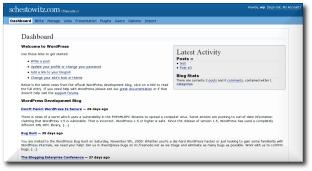Browser Racism
![]()
I choose Firefox primarily because of its
extensions. Some site continue to snub it.
 ROWSER discrimination, as it is frequently referred to, is always a bad idea. Sadly, many sites still use deprecated JavaScript code to distinguish between Netscape and Internet Explorer. In reality, most of today’s Web sites can be rendered almost ‘pixel perfect’ by Camino, Safari, Mozilla, Opera, Netscape, Firefox, Internet Explorer and several more obscure Web browsers, even Konqueror.
ROWSER discrimination, as it is frequently referred to, is always a bad idea. Sadly, many sites still use deprecated JavaScript code to distinguish between Netscape and Internet Explorer. In reality, most of today’s Web sites can be rendered almost ‘pixel perfect’ by Camino, Safari, Mozilla, Opera, Netscape, Firefox, Internet Explorer and several more obscure Web browsers, even Konqueror.
Vis-a-vis Konqueror, functionality in Konqueror is being extended all the time and its renderer (KHTML) improves rather quickly too. It no longer plays catch-up, but the acceptance of new browser is hindered by vain user-agent sniffing, which in itself is a terrible practice. In the case where proxies are being used, the assumptions might be wrong. In other circumstances, this promotes agent forging/spoofing, which only adds noise to Web statistics, adds bloat the applications and makes an unhealthy industrial environment for all to compete in.






 Filed under:
Filed under: 
 EVERAL months ago, Google’s co-founder denied rumours and shattered hopes of a so-called ‘Google Office’. It was by all means rumoured to be ‘in the works’. This story was alluded to
EVERAL months ago, Google’s co-founder denied rumours and shattered hopes of a so-called ‘Google Office’. It was by all means rumoured to be ‘in the works’. This story was alluded to 

 previously mentioned
previously mentioned 
 ORDPRESS continues to be a secure and robust piece of Web-based software. Rumours, however, sometimes stand in its way. Below is one example among several, which have been ‘severe’ enough to trigger high-profile advisories. All the hoi polloi was, needless to mention, in vain.
ORDPRESS continues to be a secure and robust piece of Web-based software. Rumours, however, sometimes stand in its way. Below is one example among several, which have been ‘severe’ enough to trigger high-profile advisories. All the hoi polloi was, needless to mention, in vain. HERE is a certain stigma or two among Web designers. Blaming of Web design be attributed to miscomprehension of design principles. Take for example some astigmatic accessibility issues, among other key factors such as browser ‘racism’. These mistakes illusrate clumsiness in Web design and infuriate minorities, which comprise equally-important Net citizens.
HERE is a certain stigma or two among Web designers. Blaming of Web design be attributed to miscomprehension of design principles. Take for example some astigmatic accessibility issues, among other key factors such as browser ‘racism’. These mistakes illusrate clumsiness in Web design and infuriate minorities, which comprise equally-important Net citizens.
 ESTERDAY I received an E-mail from a stranger. The message contained a much-sought-for answer to a question which I had asked several weeks ago. This came to show the advantages of asking questions in public forums (
ESTERDAY I received an E-mail from a stranger. The message contained a much-sought-for answer to a question which I had asked several weeks ago. This came to show the advantages of asking questions in public forums (